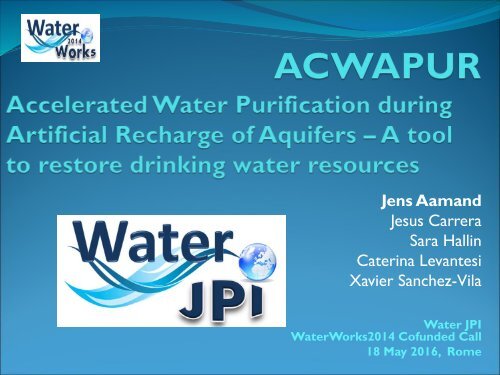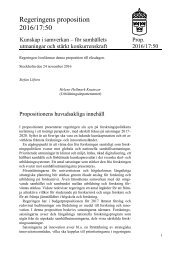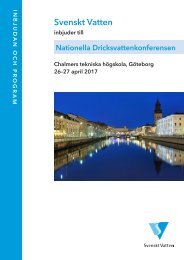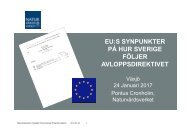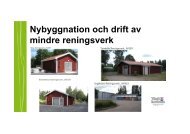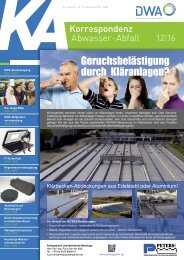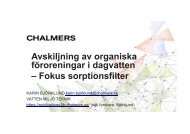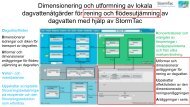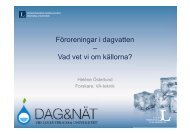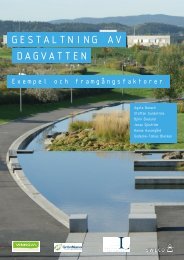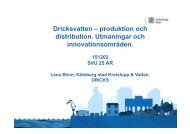Jesus Carrera Sara Hallin Caterina Levantesi Xavier Sanchez-Vila
ACWAPUR
ACWAPUR
Create successful ePaper yourself
Turn your PDF publications into a flip-book with our unique Google optimized e-Paper software.
Jens Aamand<br />
<strong>Jesus</strong> <strong>Carrera</strong><br />
<strong>Sara</strong> <strong>Hallin</strong><br />
<strong>Caterina</strong> <strong>Levantesi</strong><br />
<strong>Xavier</strong> <strong>Sanchez</strong>-<strong>Vila</strong><br />
Water JPI<br />
WaterWorks2014 Cofunded Call<br />
18 May 2016, Rome
CONSORTIUM DESCRIPTION<br />
ACRONYM TOPIC Coordination Partners<br />
ACWAPUR 1<br />
Accelerated Water Purification during<br />
Artifical Recharge of Aquifers – A tool to<br />
restore drinking water resources<br />
Artificial recharge, water recycling, reuse of<br />
water, pathogens, pollutants, drinking water,<br />
contaminants, groundwater, N, P, inorganic<br />
nutrients<br />
PRINCIPAL<br />
INVESTIGATOR<br />
INSTITUTION<br />
COUNTRY<br />
Jens Aamand Geological Survey of Denmark and Greenland Denmark<br />
<strong>Jesus</strong> <strong>Carrera</strong> Instituto de Diagnostico Ambiental y Estudios del Agua Spain<br />
<strong>Sara</strong> <strong>Hallin</strong> Swedish University of Agricultural Sciences Sweden<br />
<strong>Caterina</strong> <strong>Levantesi</strong> Italian National Council of Research Italy<br />
<strong>Xavier</strong> <strong>Sanchez</strong>-<strong>Vila</strong> Universitat Politecnica de Catalunya Spain
Artificial Recharge of Aquifers<br />
Groundwater is an important, but<br />
limited drinking water resource<br />
worldwide<br />
Over exploitation of groundwater<br />
lead to<br />
• Aquifer depletion<br />
• Salt water intrusion<br />
• Streams impairment<br />
• Wetlands desiccation<br />
International Water Management Intitute<br />
Artificial recharge of aquifer – a tool to<br />
replenish overexploited groundwater<br />
resources
Aim of Project<br />
To develop new technological applications, and<br />
management tools and guidelines to prevent leaching of<br />
pathogens, inorganic nutrients, organic pollutants, and their<br />
degradation products to underlying aquifers during Artificial<br />
Recharge of Aquifers (ARoA).<br />
This will be achieved by the construction of advanced<br />
treatment barriers that hinder leaching of pathogens and<br />
at the same time provide optimal conditions for microbial<br />
degradation processes
The JPI - Waterworks 2014 call<br />
Research and Innovation for Developing Technological Solutions and<br />
Services for Water Treatment, Reuse, Recycling and Desalination:<br />
Developing low-energy, low cost, low chemical and high-efficiency technologies<br />
and processes for water treatment and desalination<br />
Developing water recycling technologies and concepts leading to the production<br />
of safe resources for reuse;<br />
Developing innovative chemical/physical/biological tools to assess risks and to<br />
enhance the resilience of urban water systems;
Artificial Recharge of Aquifers<br />
Artificial recharge of Aquifers are used worldwide, but is most<br />
often operated as a ‘black box’ technology<br />
The technology face problems related to<br />
• Leaching of nutrients (e.g. NO 3 )<br />
• Leaching of organic pollutants (e.g. pesticides, pharmaceuticals)<br />
• Leaching of pathogens and antibiotic resistance
Steering of processes<br />
The Barrier<br />
E.g. clay, sand mixed with vegetable compost, releasing easily<br />
degradable organic matter, thereby creating series of redox<br />
conditions.<br />
The Steering Tool<br />
• Stimulation of ammonium oxidizing bacteria degrading organic<br />
pollutants co-metabolically<br />
• Supply of degrading bacteria and/or nutrients<br />
• Addition of organic carbon to facilitate N removal<br />
• Coating of barriers with iron oxides to facilitate entrapments of<br />
pathogens<br />
• Introduction of submerged plants provide oxygen and prevent<br />
clogging
Project structure
Partner experiences<br />
SLU<br />
Nitrate removing<br />
processes<br />
Molecular<br />
microbiology<br />
GEUS<br />
Sorption &<br />
degradation of<br />
contaminants.<br />
Large scale<br />
column Set-ups<br />
ACWAPUR<br />
CNR<br />
Spreading of<br />
pathogens &<br />
antibiotic<br />
resistance<br />
UPC<br />
Mathematical<br />
modelling of<br />
contaminant fate<br />
CSIC<br />
Advanced chemical<br />
analysis<br />
Experience with field<br />
work & access to<br />
field site
Research flow
Impact<br />
Artificial Recharge of Aquifers (ARoA) is considered as one of the most costeffective<br />
and environmental friendly technologies for treatment of polluted<br />
waters.<br />
In practise it is the only technology available for replenishment of overexploited<br />
water resources.<br />
ACWAPUR will improve the effectiveness of ARoA through the development of tailored and<br />
reliable barriers preventing the intrusion of organic chemicals, inorganic nutrients, and<br />
pathogens into groundwater aquifers.<br />
The ACWAPUR outcome will support water managers implementing the Water Framework<br />
Directive and other water management strategies.
Implementation
The End-Users Board<br />
Contact person Organisation/Country Field<br />
Uwe Dünnbier Berliner Wasserbetriebe, D Waterworks<br />
Victoria Colomer Catalonian Water Agency, ACA, E Government Agency- Water Resources<br />
Enric Queralt Groundwater Users Cooperative (CUADLL), E Water supply, ARoA<br />
Philip McCleaf<br />
Uppsala Water and Waste AB (Municipal<br />
company), SE<br />
Drinking Water Treatment/Water Resources<br />
Willem-Jan Knibbe Oasen, NL Waterworks<br />
Claus Jørgensen DHI, DK ARoA-advisory<br />
Paola Miana and<br />
Stefano Della Sala<br />
Veneziana Energia Risorse Idriche Territorio<br />
Ambiente Servizi (VERITAS)<br />
Waterworks
ACWAPUR<br />
A three-year project to be finished 30 th April 2019<br />
Kick-off meeting in Uppsala, Sweden 26 th May 2016<br />
Project meetings<br />
January 2017 in Copenhagen<br />
January 2018 in Barcelona<br />
November 2018 in Rome<br />
ACWAPUR will educate<br />
2 Postdocs (30 and 36 months)<br />
2 PhDs<br />
1 Early Stage Researcher (24 month)<br />
Outcome/deliverables<br />
New barrier prototypes (end of project)<br />
Guidelines for management and steering of ARoA (end of project)<br />
www.acwapur.eu


